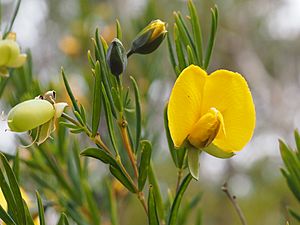Golden glory pea facts for kids
Quick facts for kids Golden glory pea |
|
|---|---|
 |
|
| Gompholobium latifolium leaves and flowers | |
| Scientific classification | |
| Kingdom: | |
| (unranked): | |
| (unranked): | |
| (unranked): | |
| Order: | |
| Family: | |
| Genus: | |
| Species: |
G. latifolium
|
| Binomial name | |
| Gompholobium latifolium Sm.
|
|
| Synonyms | |
|
Gompholobium psoraleifolium Salisb. |
|
The Golden Glory Pea, also known as Gompholobium latifolium, is a beautiful plant. It belongs to the pea family, called Fabaceae. This plant is special because it only grows naturally in eastern Australia.
It is a small bush with leaves made of three parts. In spring and early summer, it shows off large, bright yellow flowers.
Contents
What the Golden Glory Pea Looks Like
The Golden Glory Pea is a straight-growing bush. It can reach up to about 3 meters (10 feet) tall. Its stems are smooth, meaning they have no hairs.
The leaves are made of three small, narrow parts. These parts are usually about 25 to 50 millimeters (1 to 2 inches) long. They are also about 2 to 6 millimeters (0.1 to 0.2 inches) wide. The leaves have a very short stem and are darker on top.
Its Bright Yellow Flowers
The flowers are a lovely yellow color. They grow either alone or in small groups of up to three. You can find them where the leaves meet the stem, or at the end of branches. Each flower has a stalk about 10 millimeters (0.4 inches) long.
The flower has five green parts called sepals. These sepals are about 12 millimeters (0.5 inches) long. They are only joined together at their very bottom. The sepals are dark green and smooth on the outside. Inside, they are covered with soft, flat hairs.
The largest petal at the back of the flower is called the "standard" petal. It is about 20 to 30 millimeters (0.8 to 1.2 inches) long. The bottom part of the flower, called the "keel", can sometimes be a bit green. It always has many tiny hairs along its edge, up to 1 millimeter (0.04 inches) long.
When it Flowers and Fruits
Most Golden Glory Peas flower from September to November. After the flowers, the plant grows a fruit. This fruit is a type of pod called a legume. It is oval or round, up to 18 millimeters (0.7 inches) long and 10 millimeters (0.4 inches) wide. Inside, it holds about twelve to fifteen brownish, kidney-shaped seeds.
How the Golden Glory Pea Got Its Name
The Golden Glory Pea was first officially described in 1805. A scientist named James Edward Smith gave it its formal name, Gompholobium latifolium. He published his description in a book called Annals of Botany.
The second part of its name, latifolium, comes from Latin words. "Latus" means "broad" and "folium" means "a leaf". So, latifolium means "broad-leaved". This name describes the plant's wide leaves.
Where the Golden Glory Pea Lives
The Golden Glory Pea grows in dry sclerophyll forest. This type of forest has tough, hard-leaved plants. It likes sandy soil. You can find it in Queensland, New South Wales, and Victoria.
It is most common in New South Wales. There, it grows widely along the coast and in nearby mountain ranges. It is not as common in Victoria.
Growing the Golden Glory Pea in Gardens
Even though the Golden Glory Pea has beautiful yellow flowers, it is not often seen in gardens. It can be grown easily from its seeds. However, it can be hard to find seeds that will actually grow.
For the seeds to sprout, they need a special treatment. You must either boil them or scratch their hard outer shell. This helps the seed absorb water and start growing.
Images for kids
-
Gompholobium latifolium in the Gibraltar Range National Park
 | Leon Lynch |
 | Milton P. Webster |
 | Ferdinand Smith |




